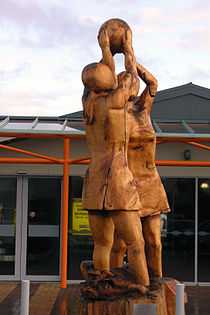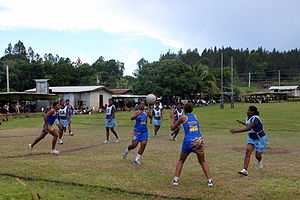Netball in Oceania

Netball in Oceania is generally regarded as a woman's sport. Women's sports in Oceania have traditionally had a very low profile.[1] Despite this, netball is popular in Oceania, with its growth partly because of New Zealand encouraging the game and providing money for the training of coaches, umpires and other netball development needs.[2] In New Zealand and in neighbouring Australia,[3] netball is one of the most popular sports played by women.[4][5][6]
Netball is one of the sports at the Pacific Games, a multi-sport event, with participation from countries around the South Pacific, that is held every four years.[7] The popularity of netball is growing amongst men on the island countries in Oceania, because sport is an important way for villages to keep in touch with each other.[7] The game's popularity can also be seen in local languages, where words have been created to describe it. In Niue, the words include neteplo, pelê neteplo, pelê.[8] The Oceania Netball Federation (ONF) is the governing body for netball in the Oceania region.[9]
New Zealand
In New Zealand, netball is the most popular women's participation sport. In 1984, there were 114,210 players.[10] There are over 11,000 teams and 120,440 players.[11] The only sport that comes close is golf, which has 128,860 male and female players.[11] Ninety-eight percent of New Zealand netball players are female.[12] The sports with the next highest rates of female participation are field hockey and horse racing, both at sixty-four percent.[13] Netball is extremely popular amongst Māori women, who are more active in sport in general than their white counterparts.[14] New Zealand took part in the 1960 netball meeting of Commonwealth countries to try to standardise the rules for the game.[15] New Zealand has a history of netball being a spectator sport with the games being televised on TVNZ.[11] The 1999 Netball World Championships final between Australia and New Zealand was the highest rated program ever on New Zealand television.[11] New Zealand also has a men's national team that has competed in the 2009 and 2011 International Challenge Men’s and Mixed Netball Tournament.[16] As of January 2011, the women's national team was ranked number one in the world.[17]
Cook Islands
The Cook Islands are a major netball playing country in Oceania,[18] with over 1,000 registered members.[19] The game became popular during the 1970s,[2] and the team has been an important in the region since then.[20] The country has participated at several international events including the Pacific Games,[20] the Commonwealth Games,[21] the Netball World Championships,[21] the World Games,[20] the Oceania Netball Tournament,[20] the World Youth Netball Championship,[18] and the International Challenge Men’s and Mixed Netball Tournament.[16] Netball has a lot of grass roots support and is an important part of life for many women on the islands.[22][23] Netball started to grow in popularity during the 1970s.[2] The sport's popularity is partly due to the influence of New Zealand, where Cook Island players have competed for New Zealand's national team. New Zealand worked hard to develop the sport in the country during the 1980s, when they hosted a number of coaching and umpiring clinics.[2] Participation in the international netball community has helped raise the Cook Islands profile globally.[24][25] The Cook Islands won the netball competition at the first South Pacific Games (now Pacific Games), held in 1981.[20] In the 1987 Netball World Championships held in Scotland the Cook Islands team came in sixth.[20] At the World Games 1989 in Germany, the team came fourth.[20] In the 1990 Oceania Netball Tournament, the team beat New Zealand, Tonga and Fiji to come in second, behind Australia.[20] At the 1992 World Youth Cup in Samoa, the Cook Islands U-21 team beat several high profile international teams including Wales, Samoa, and England.[24] The Cook Islands defeat of Canada, 114–13, in that tournament was a record for the highest number of points scored in the tournament.[24] The Cook Islands has a national team that competes in the international Golden Oldies netball tournament.[26] In 2004, a team from the Cook Islands competed in the International Schoolgirls Netball Challenge.[27] The country hosted the 2008 World Youth Championship[28] and the 2009 International Challenge Men’s and Mixed Netball Tournament.[16] As of January 2011, the women's national team was ranked number eleven in the world.[17]
Fiji

Women's participation in netball in Fiji is comparable to men's participation in rugby.[29] The sport started to grow in popularity during the 1970s.[2] Netball has a large amount of grassroots support in Fiji. Games are most often played by girls on Saturdays during the winter, though games can be played at all times of the year.[7] Samoa and Fiji are traditional netball rivals. This rivalry can be seen at events like Pacific Games.[7] Fiji was supposed to host the 2007 World Netball Championship, but a military coup occurred. IFNA decided to move the championship to Auckland instead.[29] As of January 2011, the women's national team was ranked number five in the world.[17] Fiji has a men's national team that has competed in the 2009 and 2011 International Challenge Men’s and Mixed Netball Tournament.[16]
Samoa
Netball has a large amount of grassroots support in Samoa. Games are most often played by girls on Saturdays during the winter, though games can be played at all times of the year.[7] The sport started to grow in popularity during the 1970s.[2] Rita Fatialofa was a Samoan netball player, who later went on to compete on New Zealand's national team. She became the coach for the Samoan national team, qualifying them for every Pacific Games.[30] Samoa and Fiji are traditional netball rivals. This rivalry can be seen at events like Pacific Games.[7] As of January 2011, the women's national team was ranked number nine in the world.[17] Samoa has a men's national team that has competed in the 2009 and 2011 International Challenge Men's and Mixed Netball Tournament.[16] At Gay Games VI held in 2000, a transgender netball team from Samoa competed.[31]
References
- ↑ Brawley 1997, p. 119
- ↑ 2.0 2.1 2.2 2.3 2.4 2.5 Lal & Fortune 2000, p. 458
- ↑ Department of Foreign Affairs and Trade 2008a
- ↑ Davis & Davis 2006, p. 5
- ↑ Australian Bureau of Statistics 2006
- ↑ Phillips 2011
- ↑ 7.0 7.1 7.2 7.3 7.4 7.5 McKinnon 2009, p. 51
- ↑ Sperlich 1997, p. 488
- ↑ International Federation of Netball Associations 2011e
- ↑ Van Bottenburg 2001, p. 214
- ↑ 11.0 11.1 11.2 11.3 Thompson 2006, p. 258
- ↑ Van Bottenburg 2001, p. 169
- ↑ Van Bottenburg 2001, p. 170
- ↑ Thompson 2002, p. 257
- ↑ International Federation of Netball Associations 2008
- ↑ 16.0 16.1 16.2 16.3 16.4 Samoa Observer 2011
- ↑ 17.0 17.1 17.2 17.3 International Federation of Netball Associations 2011a
- ↑ 18.0 18.1 Netball Singapore 2011b
- ↑ Cook Islands Netball Association 2009
- ↑ 20.0 20.1 20.2 20.3 20.4 20.5 20.6 20.7 Crocombe 1990, p. 13
- ↑ 21.0 21.1 Crocombe 1990, p. 54
- ↑ Alexeyeff 2009, p. 145
- ↑ Alexeyeff 2009, p. 85
- ↑ 24.0 24.1 24.2 Sissions 1999, p. 128
- ↑ Pacific Islands Political Studies Association 1994, p. 280
- ↑ Crocombe 2007, p. 427
- ↑ School Sport Australia 2011
- ↑ Jonassen & Tikivanotau 2008, p. 148
- ↑ 29.0 29.1 Starnes & Luckham 2009, p. 42
- ↑ Lal & Fortune 2000, p. 462
- ↑ Symons & Hemphill 2006, p. 122
Bibliography
- International Federation of Netball Associations (15 June 2008). "History of Netball". Retrieved 2 March 2011.
- International Federation of Netball Associations (21 January 2011a). "Current World Rankings". Retrieved 4 March 2011.
| ||||||||||||||||||||||||||||||||||||||||||||||||||||||||
